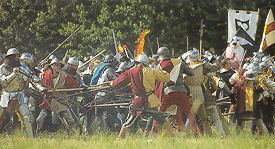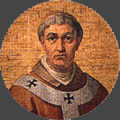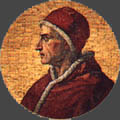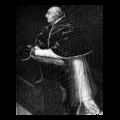|
Events of the Dark Ages
There were many events that shaped the Dark Ages in Europe. Those
events include:
The First Crusade:
(This drawing portrays the final battle
for Jerusalem) 
The first crusade was ignited by a speech given by Pope Urban II in
France in 1095. He thought that Christianity should be restored to
the muslim controlled Jerusalem. Urban gained a lot of support by
telling the perspective fighters that they would receive spiritual
rewards. On the way to Jerusalem, the crusaders (Or pilgrims as they
were called back in those days) would gain control of Constantinople,
Dorylaeum, Antioch and many other small territories. It was no easy
task. But, With the help of italian reinforcements They would take
over the muslim controlled Jerusalem. They would continue to control
it until 1098.
This is important because it showed people's tremendous belief in
God. People fought and died (and fought and died) because they felt
if the Turk were removed from Jerusalem, they would be granted ever
lasting peace in heaven. They believed that god wanted it this way.
Although there were large amounts of casualties, they continued
fighting because they thought they were fighting for God.
The start of the 100 Years War:
(A reenactment of a hundred years war battle)

The English and the French would battle back and forth from 1347
to 1453. They did not fight for one hundred years straight. There
were several truces and treaties throughout the one hundred years.
The Hundred Years War erupted when Edward III claimed he should be
the King of France because he was the son of Isabella (who was the
wife of the recently deceased king Charles IV). When the french did
not accept him as king that prompted him to ` attack France from the
north. Edward III took the city of Calais where his son Edward the
black prince would take over where his father left off (after his
death). He would take Bordeaux and Poitiers. In the later battle of
Poitiers he took captive the French King, John II. After this battle
the treaty of Bretigny would be signed, giving England a victory.
They had taken over a good portion of french land.
There was no real formal treaty signed. Charles V of France would
re-ignite the war by invading the land that the Black Prince had
taken over. After Edward III and Edward the black prince died in
1377, England did not have a chance. The truce that was signed in
1396 lasted until 1415. Henry the V had battle after battle with the
leader of France at the time, Charles VI. There sons would follow in
their footsteps for the same reasons. They did not want to be
burdened with a treaty and they wanted ultimate power of France. Then
Joan of Arc drove the english to the north in 1429. After the battles
with Joan of Arc, the fighting slowly started to stop. The french
would take over all previously-claimed lands and crowned Charles VII
as king of France.
This is important because it showed the strong sense of
nationalism between the two countries. Although they both fought for
France, the English fought to gain control of something that was not
considered theres, where the french were fighting a defensive war for
their mother country. It also introduced a centralized-type
government with one absolute ruler.
The Great Schism:
 (Urban VI) (Urban VI)  (Gregory XII) (Gregory XII)  (Pope Martin
V) (Pope Martin
V)
While the Hundred Years War was in full swing, the Roman Catholic
Church was going through a crisis as well. There was confusion on who
was the real pope. When Pope Gregory XII died, people rioted in the
streets because they felt that the city of Avignon would take
control. The people didn't like this because they wanted an italian
or roman pope. Urban VI was elected the new pope but would not last
long. His election was nulled because of his bad attitude toward the
church. Clement VII was elected as the new pope but Urban would
refuse to yield to him. Clement left back for Avignon where he was "a
pope" amongst other popes. "Schisms" would then run rampant because
there were different popes in different cities. Urban VI along with
Boniface IX, Innocent VII and Gregory XII were popes of Rome. Iin
Avignon, Clement VII and Benedict XIII were the popes. The French
would make a deicison not to give Clement or Benedict XIII the pope
title. During the meeting of the council of Pisa, Gregory XII (Rome)
and Benedict XIII (Avignon) lost their position as pope. The pope
that was elected during the council had no real influence on the
church because he died shortly after election. The Council of
Constance would eventually dispose of Alexander's successor and
Benedict XIII. Also, during the same time, Gregory XII resigned,
Martin V would be named the new pope. The schisms would end shortly
after./
This is important because it shows a lack of disorganization in
the one thing that people generally believed in more than anything,
the church. How could anyone believe what the church says when they
cant even find the right person to present God's will? In times of
war, and plague, the church needs to be solid and secure with
everything it does. At this time it was not.
So Why is this time called the Dark Ages?
This time period is given the approriate tile. It was a time of
greed, confusion and death. People fought for causes they thought
were crucial to their existence. They also fought because they were
forced to go into war out of a King's greed. They also fought beause
they thought it was God's will and that they would goto heaven and
their families would be safe for the years to come.
|
